De Franse schrijfster Anna Gavalda werd geboren op 9 december 1970 in Boulogne-Billancourt. Zie ook alle tags voor Anna Gavalda op dit blog.
Uit: L’Échappée belle
Ce que nous vivons là, c’était un peu de rab. Un sursis, une parenthèse, un moment de grâce. Quelques heures volées aux autres… Pendant combien de temps aurions-nous l’énergie de nous arracher ainsi du quotidien pour faire le mur ? Combien de permissions la vie nous accorderait-elle encore ?
(…)
« Il y a plein de choses dans notre tête. (…) Il y a de la musique et des écrivains. Des chemins, des mains, des tanières. Des bouts d’étoiles filantes recopiés sur des reçus de carte bleue, des pages arrachées, des souvenirs heureux et des souvenirs affreux. Des chansons, des refrains sur le bout de nos langues. Des messages archivés, des livres massues, des oursons à la guimauve et des disques rayés. Notre enfance, nos solitudes, nos premiers émois et nos projets d’avenir. Toutes ces heures de guet et toutes ces portes tenues. (…) nos fantasmes de provinciaux et nos veilles d’examen. (…) L’odeur de poussière et de pain sec des chevaux, le soir, quand nous descendions du car. Les Lalanne dans leurs ateliers séparés par un jardin. (…) Toutes ces bêtises, tous ces remords, et nos bulles de savon à l’enterrement du parrain de Lola…
Nos amours perdus, nos lettres déchirées et nos amis au téléphone. Ces nuits mémorables, cette manie de toujours tout déménager et celui ou celle que nous bousculerons demain en courant après un autobus qui ne nous aura pas attendus.
Tout ça et plus encore.
Assez pour ne pas s’abîmer l’âme. Assez pour ne pas essayer de discuter avec les abrutis. Qu’ils crèvent. Ils crèveront de toute façon. Ils crèveront pendant que nous serons au cinéma.”
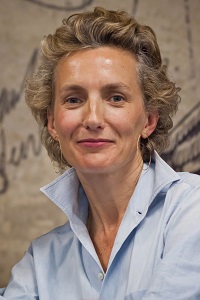
Anna Gavalda (Boulogne-Billancourt, 9 december 1970)
De Hongaars-Duitse schrijver Ödön von Horváth werd geboren op 9 december 1901 in Fiume. Zie ook alle tags voor Ödön von Horváth op dit blog.
Uit: Jugend ohne Gott
„Als ich am nächsten Morgen in das Gymnasium kam und die Treppe zum Lehrerzimmer emporstieg, hörte ich auf dem zweiten Stock einen wüsten Lärm. Ich eilte empor und sah, daß fünf Jungen, und zwar E, G, R, H, T, einen verprügelten, nämlich den F.
»Was fällt euch denn ein?« schrie ich sie an. »Wenn ihr schon glaubt, noch raufen zu müssen wie die Volksschüler, dann rauft doch gefälligst einer gegen einen, aber fünf gegen einen, also das ist eine Feigheit!«
Sie sahen mich verständnislos an, auch der F, über den die fünf hergefallen waren. Sein Kragen war zerrissen. »Was hat er euch denn getan?« fragte ich weiter, doch die Helden wollten nicht recht heraus mit der Sprache und auch der Verprügelte nicht. Erst allmählich brachte ich es heraus, daß der F den fünfen nichts angetan hatte, sondern im Gegenteil: die fünf hatten ihm seine Buttersemmel gestohlen, nicht, um sie zu essen, sondern nur, damit er keine hat. Sie haben die Semmel durch das Fenster auf den Hof geschmissen.
Ich schaue hinab. Dort liegt sie auf dem grauen Stein. Es regnet noch immer, und die Semmel leuchtet hell herauf.
Und ich denke: vielleicht haben die fünf keine Semmeln, und es ärgert sie, daß der F eine hatte. Doch nein, sie hatten alle ihre Semmeln, und der G sogar zwei. Und ich frage nochmals: »Warum habt ihr das also getan?« Sie wissen es selber nicht. Sie stehen vor mir und grinsen verlegen. Ja, der Mensch dürfte wohl böse sein, und das steht auch schon in der Bibel. Als es aufhörte zu regnen und die Wasser der Sündflut wieder wichen, sagte Gott: »Ich will hinfort nicht mehr die Erde strafen um der Menschen willen, denn das Trachten des menschlichen Herzens ist böse von Jugend auf.«
Hat Gott sein Versprechen gehalten? Ich weiß es noch nicht. Aber ich frage nun nicht mehr, warum sie die Semmel auf den Hof geworfen haben. Ich erkundige mich nur, ob sie es noch nie gehört hätten, daß sich seit Urzeiten her, seit tausend und tausend Jahren, seit dem Beginn der menschlichen Gesittung, immer stärker und stärker ein ungeschriebenes Gesetz herausgebildet hat, ein männliches Gesetz: Wenn ihr schon rauft, dann raufe nur einer gegen einen! Bleibet immer ritterlich! Und ich wende mich wieder an die fünf und frage: »Schämt ihr euch denn nicht?«
Sie schämen sich nicht. Ich rede eine andere Sprache. Sie sehen mich groß an, nur der Verprügelte lächelt. Er lacht mich aus.“
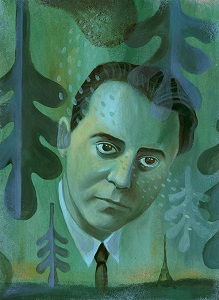
Ödön von Horváth (9 december 1901 – 1 juni 1938)
Portret door Alice Wellinger, 2017
De Engelse dichter en schrijver John Milton werd geboren op 9 december 1608 in Londen. Zie ook alle tags voor John Milton op dit blog.
Uit: Paradise Lost (Book I)
Is this the Region, this the Soil, the Clime,
Said then the lost Arch-Angel, this the seat
That we must change for Heav’n, this mournful gloom
For that celestial light? Be it so, since he
Who now is Sovran can dispose and bid
What shall be right: fardest from him is best
Whom reason hath equald, force hath made supream
Above his equals. Farewel happy Fields
Where Joy for ever dwells: Hail horrours, hail
Infernal world, and thou profoundest Hell
Receive thy new Possessor: One who brings
A mind not to be chang’d by Place or Time.
The mind is its own place, and in it self
Can make a Heav’n of Hell, a Hell of Heav’n.
What matter where, if I be still the same,
And what I should be, all but less then he
Whom Thunder hath made greater? Here at least
We shall be free; th’ Almighty hath not built
Here for his envy, will not drive us hence:
Here we may reign secure, and in my choyce
To reign is worth ambition though in Hell:
Better to reign in Hell, then serve in Heav’n.
But wherefore let we then our faithful friends,
Th’ associates and copartners of our loss
Lye thus astonisht on th’ oblivious Pool,
And call them not to share with us their part
In this unhappy Mansion, or once more
With rallied Arms to try what may be yet
Regaind in Heav’n, or what more lost in Hell?
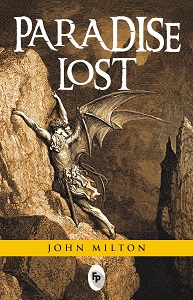
John Milton (9 december 1608 – 8 november 1674)
Cover
De Tsjechische psycholoog, schrijver en dichter Jan Křesadlo (pseudoniem van Václav Jaroslav Karel Pinkava) werd geboren op 9 december 1926 in Praag. Zie ook alle tags voorJan Křesadlo op dit blog.
Travesty
3.
I have but words that don’t sound right
all has now fallen through, alas
there’s no fresh start, try as I might
deep down up-speaks the looking glass
If on the well-beam one could place
a candle new, on well-sill verge
then blue and white doves would converge
to make their spousal vows apace
If out of tears one could conceive
a fireproof cloak of see-through weave
and velvet crofts from sighs could swell
In our eye-pupils secreted
are Sibylls, invisibly hid
faces of vampires in nut shells
4.
And no one listens, heed to take
the empty drum pulse of the heart
I scan the horologe, its darts
it is too late, for Jesus’ sake
Before I’d tuned my strings to play
the lunar lute has turned to dust
only its spectral form, away
an angel’s airborne heel flies past
The hourglasses, water, sand
slow turning upside down keep shape
the day drips by in silent strands
Gone for good now, the crowing pride
the hapless monk’s face quiet bides
crystallizing beneath its cape
Vertaald door Václav Z J Pinkava
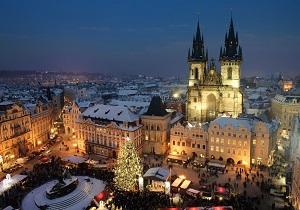
Jan Křesadlo (9 december 1926 – 13 augustus 1995)
Praag in de Adventstijd
De Wit-Russische (Belarussische) dichter, journalist en criticus Maksim Bahdanovič werd geboren op 9 december 1891 in Minsk. Zie ook alle tags voor Maksim Bahdanovič op dit blog.
Emigrants’ song
There are in this world such far-rovers,
Who believe not in God not in devil,
Who delight in bright banners high over
The ships that in ocean ports revel…
They have none to leave here whom they cherish,
For they have neither kin nor belongings,
They care not if they live or they perish,
On one sole aim are fixed all their longings:
To visit lands, so far unsought-for,
To taste there of fortune and grieving,
And to perish among the salt waters
Of blue seas where white foam is seething.
But we do not seek such a bounty,
It is not far lands we are needing,
We would not have left our dear country
If there had been bread for our feeding.
And in clatter and noise of streets roaming,
Where the crowd ever-restless whirls streaming,
We dream of the village, the Nioman,
And Libava with harbour lights gleaming.
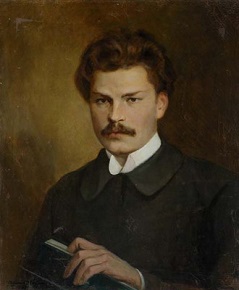
Maksim Bahdanovič (9 december 1891 – 25 mei 1917)
De Amerikaanse schrijver en sceenwriter James Dalton Trumbo werd geboren op 9 december 1905 in het plaatsje Montrose in Colorado. Zie ook alle tags voor Dalton Trumbo op dit blog.
Uit: Johnny Got His Gun
“My arm. My arm they’ve cut my arm off. See that stump there? That used to be my arm. Oh sure I had an arm I was born with one I was normal just I like you and I could hear and I had a left arm like I anybody. But what do you think of those lazy bastards cutting it off?
How’s that I can’t hear either. I can’t hear. Write it down. Put it on a piece of paper. I can read all right. But I can’t hear. Put it down on a piece of paper and hand the paper to my right arm because I have no left arm.
My left arm. I wonder what they’ve done with it. When you cut a man’s arm off you have to do something with it. You can’t just leave it Iying around. Do you send it to hospitals so guys can pick it to pieces and see how an arm works? Do you wrap it up in an old newspaper and throw it onto the junk heap? Do you bury it? After all it’s part of a man a very important part of a man and it should be treated respectfully. Do you take it out and bury it and say a little prayer? You should because it’s human flesh and it died young and it deserves a good sendoff.
*****
Then things quieted down all of a sudden. Everything went still inside his head. The lights before his eyes snapped out as quickly as if somebody had shut them off with a switch. The pain went away too. The only feeling he had was the strong throb of blood in his brain swelling and contracting his head. But it was peaceful. It was painless. It was such a relief that he came out of his drowning. He could think.
He thought well kid you’re deaf as a post but there isn’t the pain. You’ve got no arms but you don’t hurt. You’ll never burn your hand or cut your finger or smash a nail you lucky stiff. You’re alive and you don’t hurt and that’s much better than being alive and hurting. There are lots of things a deaf guy without arms can do if he doesn’t hurt so much he goes crazy from pain. He can get hooks or something for arms and he can learn to read lips and while that doesn’t exactly put him on top of the world still he’s not drowned in the bottom of a river with pain tearing his brain to pieces. He’s still got air and he’s not struggling and he’s got willow trees and he can think and he’s not in pain.”
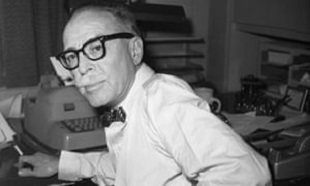
Dalton Trumbo (9 december 1905 – 10 september 1976)
